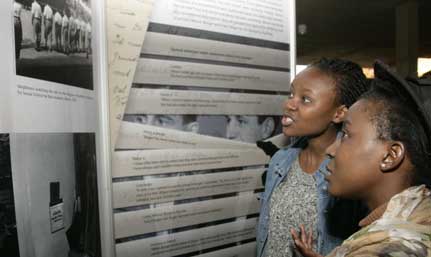|
 |
The history of the persecution of homosexuals during the Nazi era on display.
Photo: Johan Roux
06 June 2013 |
The exhibition In Whom Can I Still Trust? portrays the history of the persecution of homosexuals during the Nazi era. It cuts even closer to home, as it also explores the protection of sexual minorities in South Africa as well.
Richard Freedman, Director of the South African Holocaust & Genocide Foundation, was the guest speaker during the opening.
The exhibition is brought to South Africa thanks to the efforts of the South African Holocaust & Genocide Foundation. The foundation redesigned and developed the exhibition specifically for South Africa. Originally under the curatorship of Dr Klaus Mueller from Berlin, on behalf of IHLIA (Homosexual and Lesbian Archive, Amsterdam), the exhibition highlights the largely-untold history of the persecution of homosexuals in Nazi Germany. Archive photographs, personal testimonies and video clips relate the historical narrative to the prejudices still facing homosexuals today.
Through additional panels, the exhibition aims to focus attention on the protection of sexual minorities in South Africa. The It Gets Better South Africa Project – a collection of videos that discourages homophobic bullying – forms an important part of the exhibition. The interviewees range from struggle hero Ahmed Kathrada and Nobel Peace Laureate Archbishop Emeritus Desmond Tutu to TV personality Joanne Strauss.
In Whom Can I Still Trust? is hosted by the Institute for Reconciliation and Social Justice at the UFS in partnership with the South African Holocaust & Genocide Foundation, the Open Society Foundation for South Africa, the Johannes Stegmann Art Gallery and Student Affairs.
Exhibition runs: 6 –14 June 2013
Place: Thakaneng Bridge